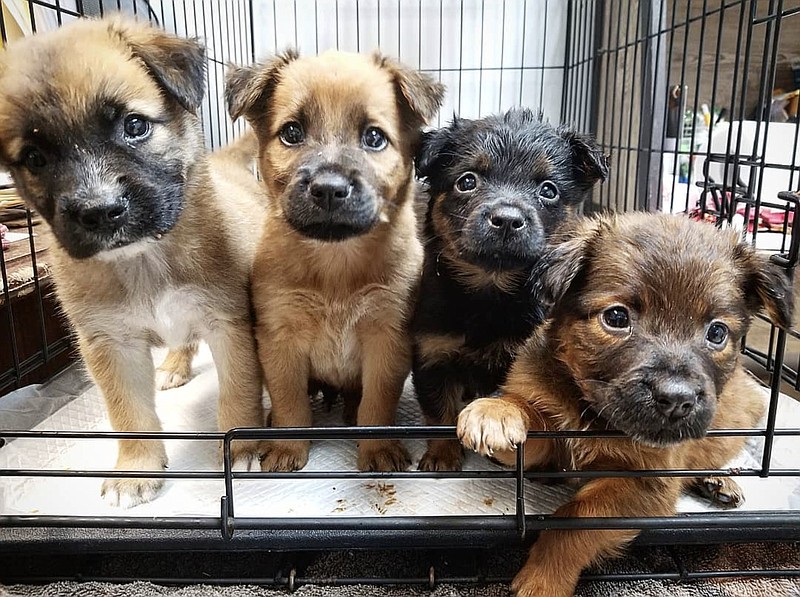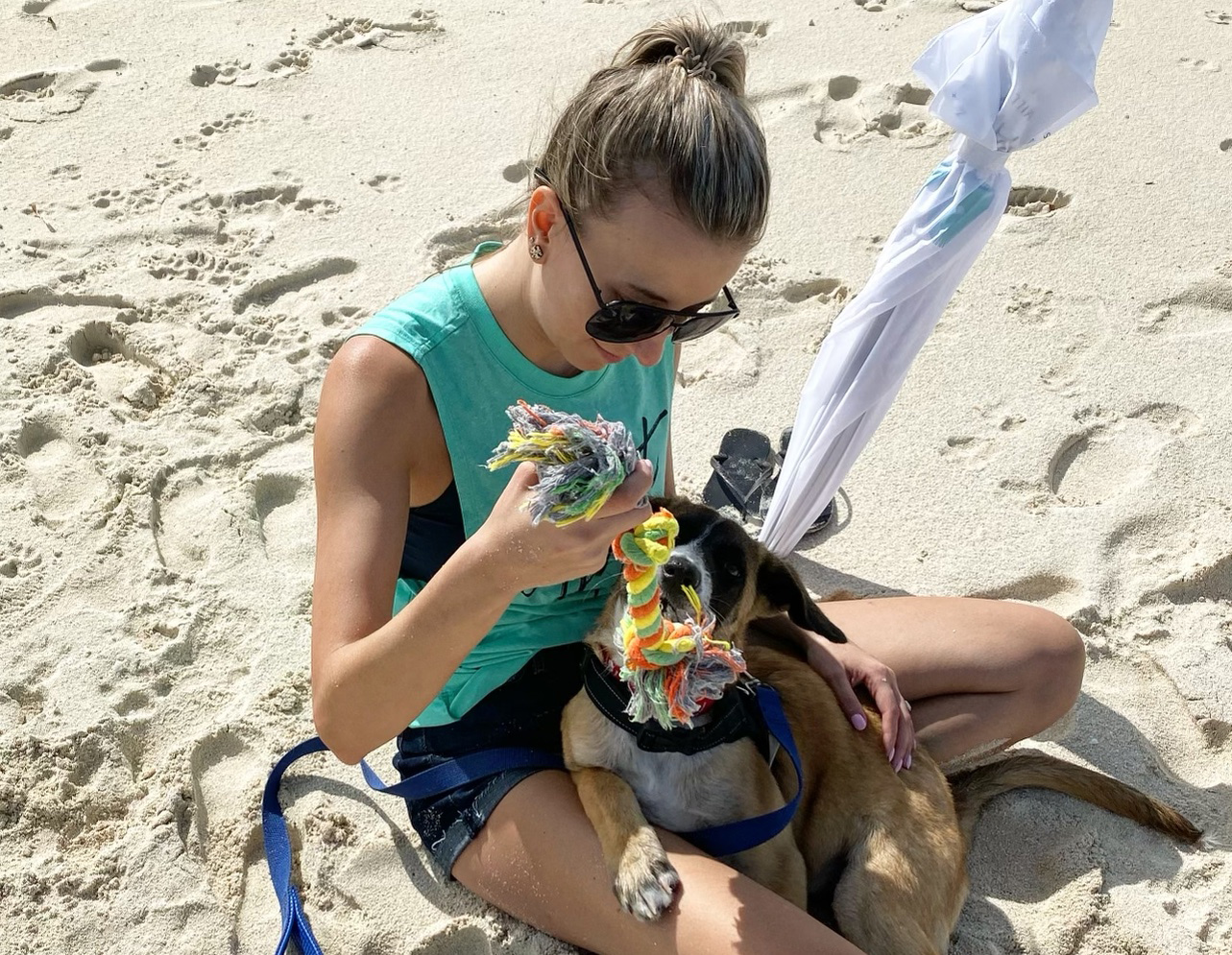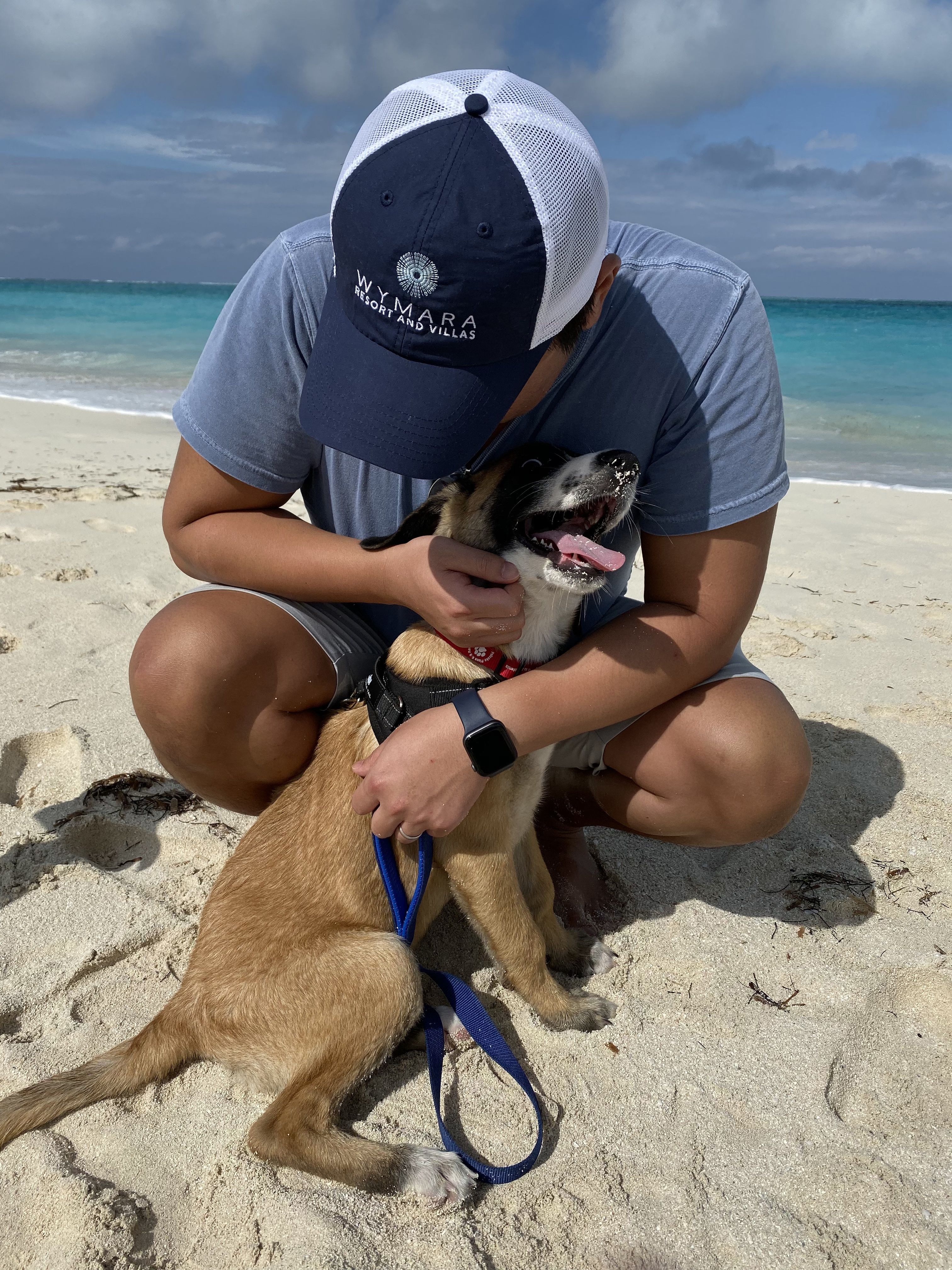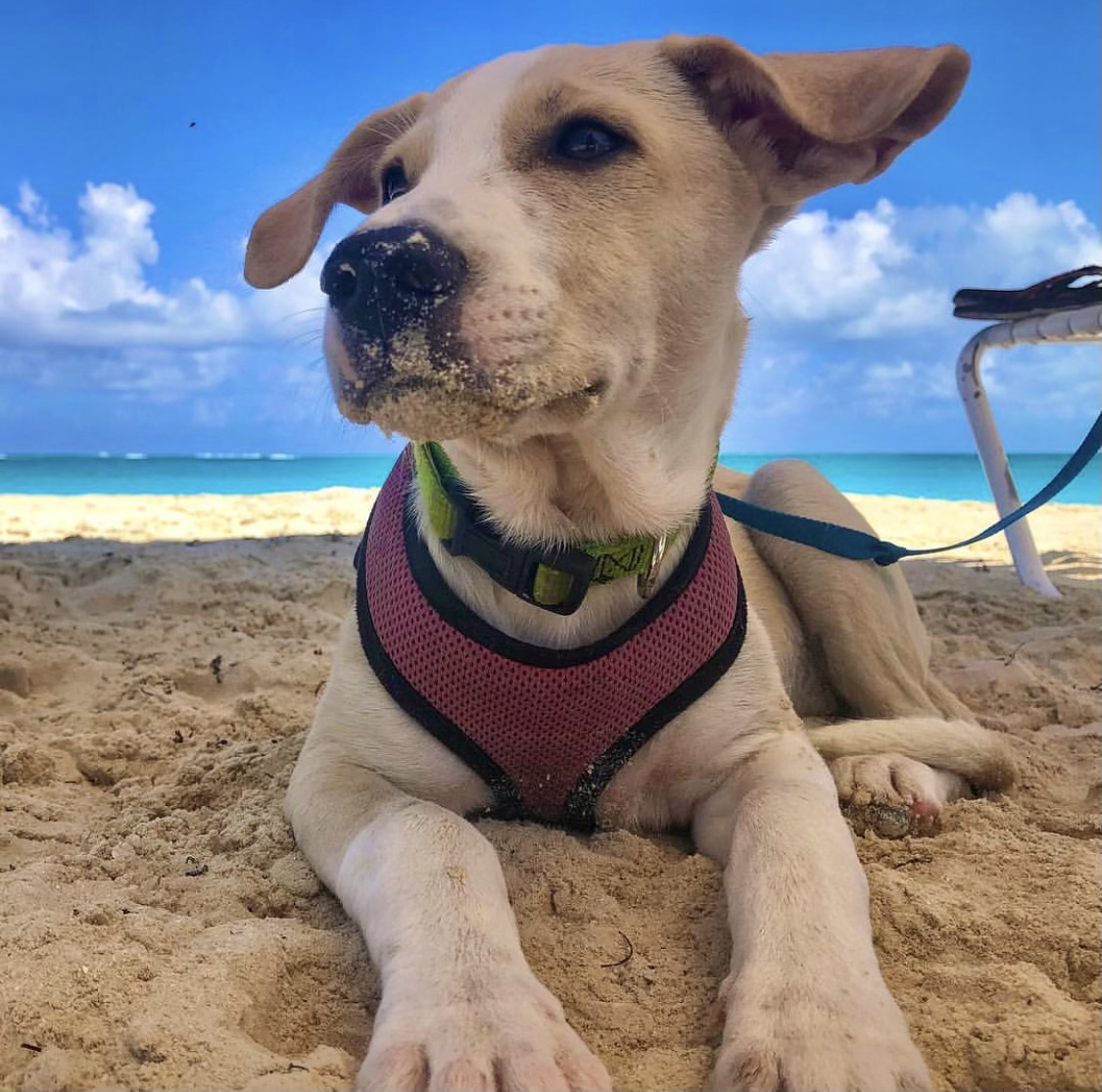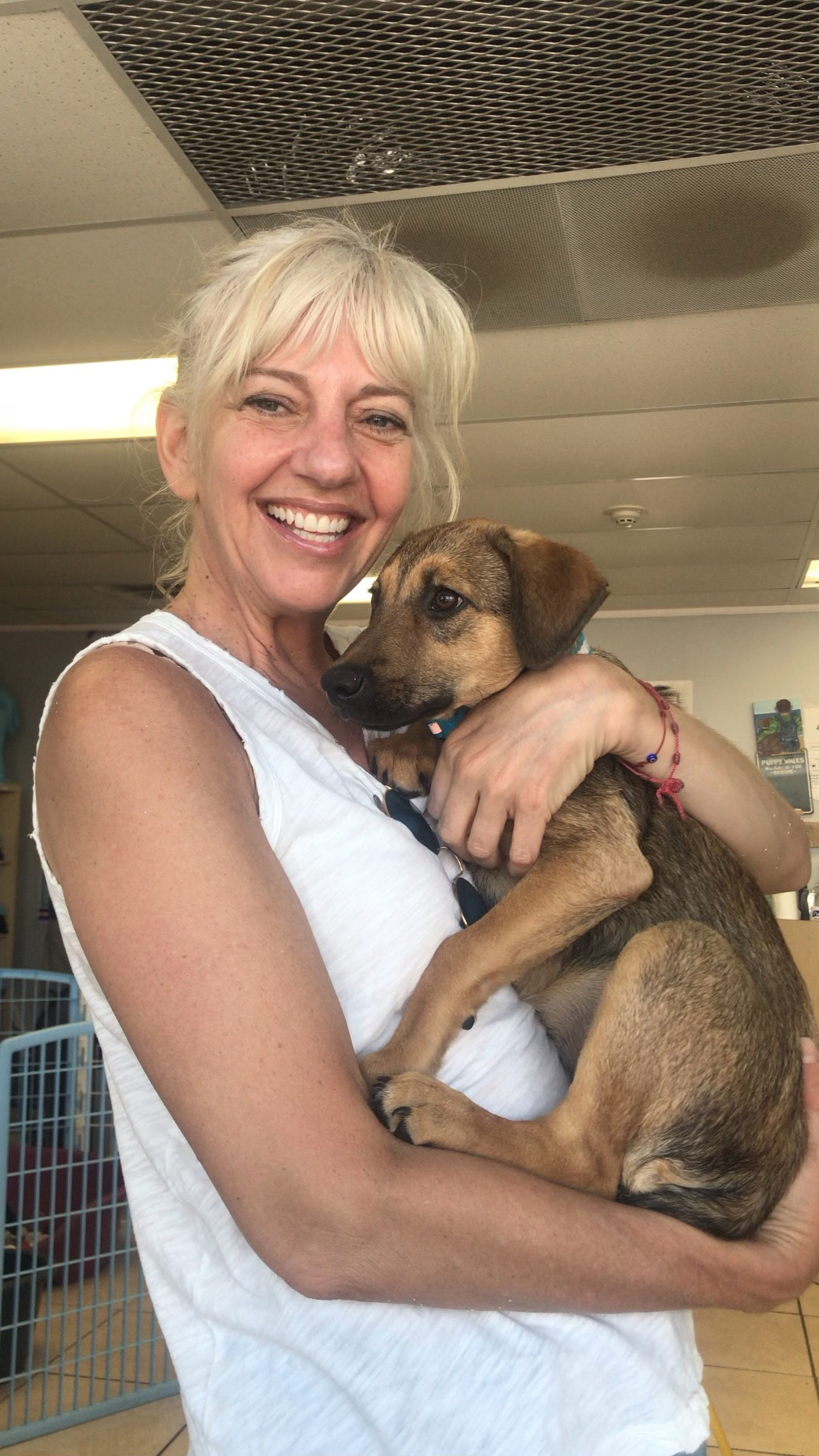When Brandon and Alyse Kay embarked on their honeymoon to the Turks and Caicos Islands, the last thing they expected was to bring a puppy home with them to Chicago.
"We had no intention of bringing a dog back," said Brandon Kay. "Next thing I knew, I was carrying a dog through customs."
The couples' dog - whom they adopted in 2019 and named Blueberry because he was found under a berry bush - is one of thousands of puppies that a team of local volunteers have rescued and placed for adoption with tourists like the Kays.
"Our lives were changed forever," said Brandon Kay, adding that, despite being born in a tropical climate, Blueberry adores the snow. "He is such a big part of who we are."
Jane Parker-Rauw is the founder and director of Potcake Place K9 Rescue. She started the nonprofit organization in 2004, but "I was rescuing dogs for probably about five years before that, just unofficially," she said.
Brandon Kay said that his wife had heard about the charity before their trip, and she suggested they go visit the adoption center in Grace Bay to see the cute puppies.
The rescue group has a storefront in a busy shopping area, and tourists line up in the mornings to have a chance to take a pup on a walk on the beach. Sometimes the line snakes around the block.
Parker-Rauw, who is originally from England, moved to the island in 1996 for a job in the spa industry. She initially signed on for a 12-month contract and ended up staying.
Soon after moving to Turks and Caicos, she noticed an abundance of stray dogs - called "potcakes" - roaming around. The name potcakes came about because locals regularly left out their cooking pots - which were caked with food remnants - for the dogs to eat, she said. Other Caribbean islands are known for having potcakes, too.
There was limited infrastructure and regulation in place to prevent the potcakes from excessively breeding. The result: tons of puppies, and not enough people to look after them.
"Just seeing the problem, I wanted to try to do something to help," recalled Parker-Rauw, who said she has always been an animal lover, although she had no experience working with dogs.
She began volunteering at the Turks and Caicos Society for the Prevention of Cruelty to Animals, and would go door-to-door in residential areas to speak with locals about spay and neuter services. In many cases, the dogs had already started breeding.
"Every house came with six to 13 puppies, and the SPCA had nowhere to put them," said Parker-Rauw, whose job at the time was to have the puppies euthanized. "It wasn't out of cruelty. They just had nowhere to put all these pups."
Dogs that are not neutered or spayed can produce a line of thousands of puppies in the span of only a few years. Dogs as young as 6 months old can get pregnant and then have a litter of puppies, with an average of seven at a time, although some litters are larger. A single female dog can birth up to 70 puppies in her lifetime.
Those puppies - if not spayed and neutered - then go on to reproduce, too, and the number of potcakes expands exponentially.
Watching so many helpless potcake puppies die was painful for Parker-Rauw.
"I understood why it had to be done," she said. "But it didn't sit too well with me."
After successfully adopting out one puppy, "I decided, there's a place for every potcake," Parker-Rauw said.
So she started Potcake Place - an all-volunteer staffed charity, which depends on donations to operate. A group of about 15 volunteers rescue the puppies - which they often find through the SPCA. Locals and tourists also alert them when they spot a litter, and people frequently leave boxes filled with abandoned puppies outside the adoption center.
At any given time, there are between 60 and 100 puppies and dogs under Potcake Place's care. They are mostly fostered in local volunteer homes until they are adopted. On a yearly basis, the organization helps adopt about 500 dogs to people from the United States, Canada and elsewhere.
"We really care about where these pups go," said Parker-Rauw, adding that her team conducts a rigorous inspection before finalizing an adoption, which includes vet references and background checks. "We don't want them ending up in shelters."
"You can't just come down here and pick out a puppy and take it home," she added. "It's a serious commitment, and we take it very seriously."
Although the adoption requirements are rigid, "we adopt out every single one of our puppies," Parker-Rauw said.
Many of the rescued puppies have a rough start to life, including Lauren Olzawski's dog, Adira, who was found in a junkyard inside an old washing machine four years ago.
A few months after Adira was rescued, Olzawski - who lives in Loudoun County, Va. - arrived in Turks and Caicos for a vacation with her best friend. Whenever she travels, she said, she makes a point of volunteering at local rescue organizations.
"I had thought about adopting, but I hadn't really confirmed it in my head," the 30-year-old said.
She eagerly signed up to take a puppy on a socialization walk along the beach.
While Adira was shy when they first met, "she totally blossomed," said Olzawski, who decided the pup had to be hers.
Puppy walks have become a popular tourist attraction in the area. While it's a fun (and free) activity for tourists, it serves an important purpose for Potcake Place. "Ultimately, you're helping these puppies get adopted by socializing them," Olzawski said, adding that she was amazed at how invested Potcake Place volunteers are in each dog. "So many dogs go in and out of that place, and they know them all on a personal level."
Adam Kronick and his family had a similar experience. They took their now 4-year-old potcake, Millie, on a walk along the beach several years ago while on a family vacation "and fell in love," he said. "That was it."
Millie was found wandering alone on the Millennium Highway, which is how she got her name. At the mercy of his wife and three children, Kronick said, he had no choice but to bring Millie home to Toronto at the end of their trip.
Tensions were high when they introduced Millie to her brother, Rudy - a goldendoodle-labradoodle mix - but before long "they became best friends."
Most people bring their dogs home with them (pets under 20 pounds can sit in the cabin of commercial flights of most airlines), but some rely on volunteer couriers to transport them. Heavier dogs must be transported in the plane's cargo hold.
"At least 40 percent of people that adopt with us are with couriers," said Parker-Rauw, explaining that many people decide weeks or months after visiting Turks and Caicos that they want to adopt a dog. The charity tries to find a willing tourist to fly the dog to an accessible airport on their way home. Generally, the adopters pay the $125 cabin fee. "It's just a really good thing to do."
In its own way, Parker-Rauw said, being a courier is "very rewarding," particularly for individuals who don't feel ready to adopt. "You can help in lots of ways other than adopting."
Each puppy costs the charity roughly $300 to $500 to look after before they are adopted. Some visitors offer to sponsor a dog instead of adopting or transporting the animal.
"You can save a dog without having to take it in," Parker-Rauw said.
In addition to sponsoring, many people simply donate online, or deliver needed supplies when visiting the adoption center. Thousands of potcake owners and supporters belong to a Facebook group where people share updates and photos, as well as offer help and advice.
"Potcake Place is a huge network of people that just want to make a difference," said Parker-Rauw, who, in her spare time, visits local schools to educate children about the importance of spaying, neutering and animal welfare.
"We are not just a fluffy puppy organization," she said. "This all comes down to education."
"There has been huge progress in that. It's the younger generation that I need to get to," said Parker-Rauw, noting that, while adoptions are helping the problem, her primary goal is to prevent puppies from needing rescuing in the first place.
Meanwhile, Parker-Rauw and her team are dedicated to helping every potcake puppy they can.
"Not everyone can do everything," she said. "But everyone can do something."

